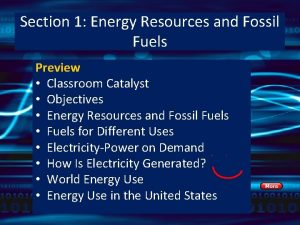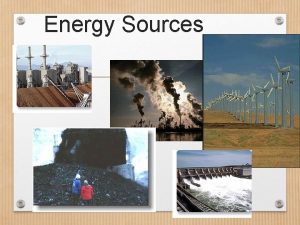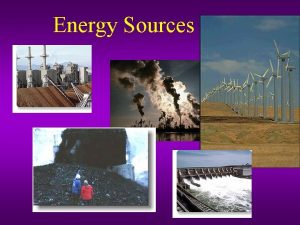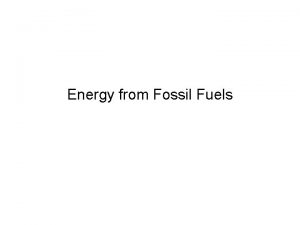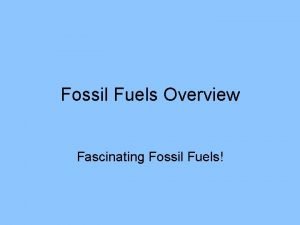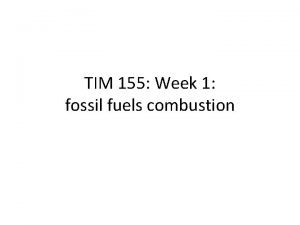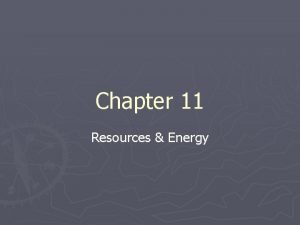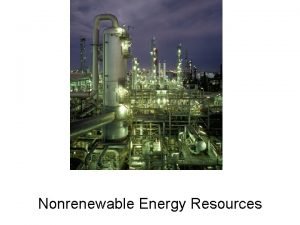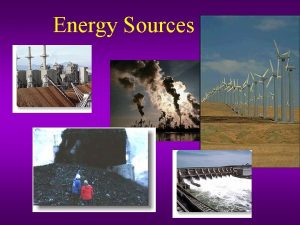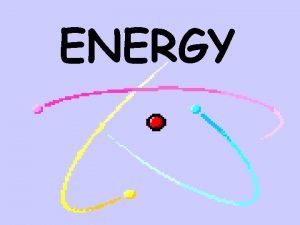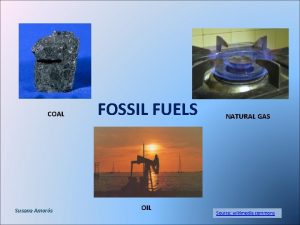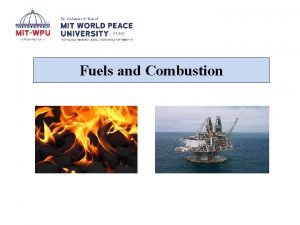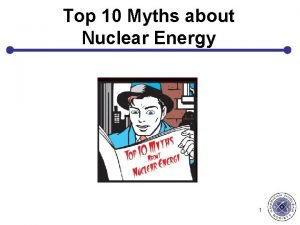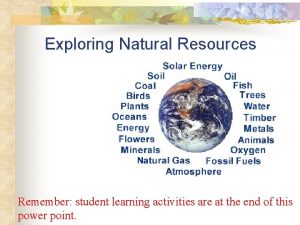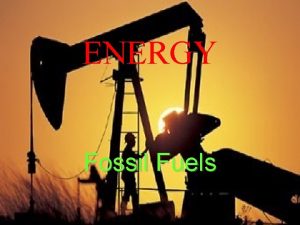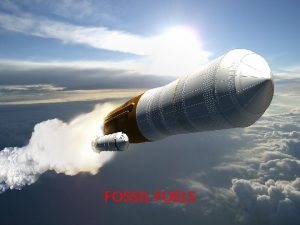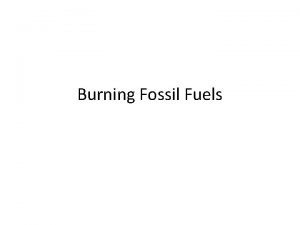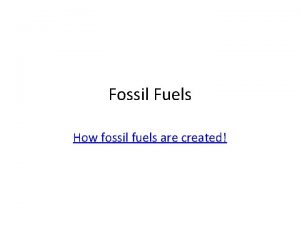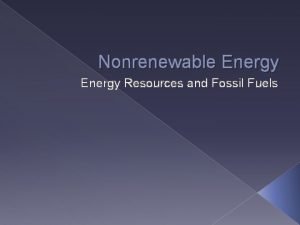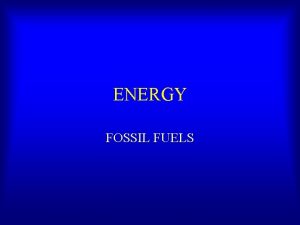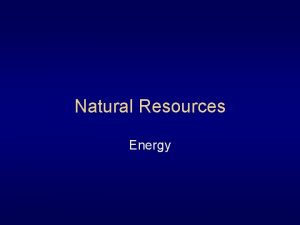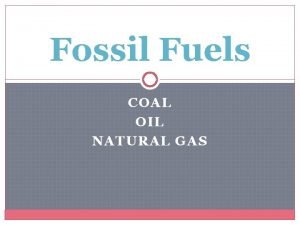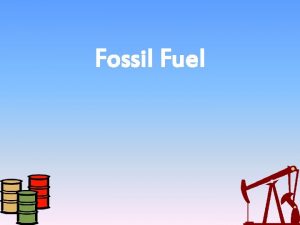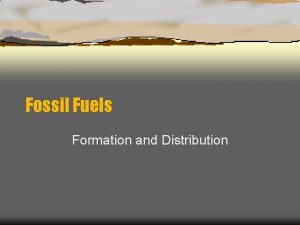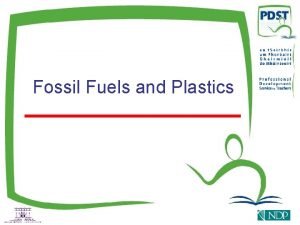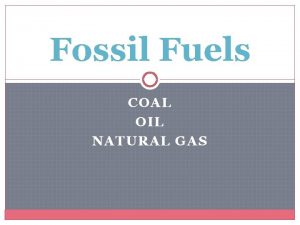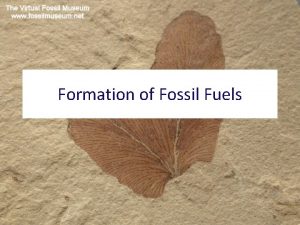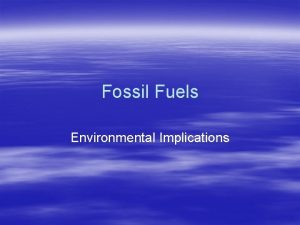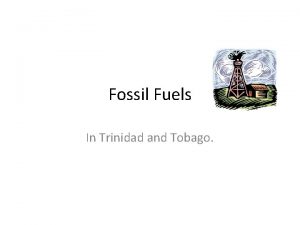Energy from Fossil Fuels Energy from Chemistry Question




















- Slides: 20

Energy from Fossil Fuels

Energy from Chemistry • Question – What is “chemical” energy? • A form of potential energy • Potential energy is stored in the (valence) electrons of atoms and molecules • Lecture Questions – What are exothermic and endothermic chemical reactions? • Exothermic reaction: produces energy, usually as heat or light • Endothermic reaction: consumes energy as it proceeds – Why do some reactions produce energy (and some consume it)? • Chemical reactions – – Consists of breaking and forming bonds The formation of bonds always yields energy The breaking of bonds always requires energy The balance between these two processes determines the net energy yield/requirement of a chemical reaction

The Fossil Fuels • What are the main fossil fuels? – Coal, oil (petroleum), natural gas Global • How are they mostly used? – Coal: electricity – Oil: transportation, heating – Natural gas: heating, electricity, cooking OECD

Use of Coal

Use of Natural Gas

Use of Oil

King Coal • Lecture Questions – What is coal? • A solid mixture consisting largely (about 85%) of carbon – Representative formula is C 135 H 96 O 9 NS – Plenty of other impurities » Toxic metals like Pb, Hg, As » Radioactive isotopes of various types – Three broad grades of coal » Anthracite (hard coal). Highest carbon content and heat value. » Bituminous coal (soft coal) » Lignite (brown coal). Lowest carbon content and heat value. – How is coal formed? • Originated as plant matter in hot, muggy regions – Most current coal formed 200 -350 million years ago – Plant matter decays under conditions of low oxygen, high heat and pressure » First converted to peat

Natural Gas • What is natural gas? – Gaseous mixture of hydrocarbons • Mostly methane, CH 4 (60 -80%) • Others: C 2 HCs (5 -9%), C 3 HCs (3 -18%), C 4 HCs(2 -14%) • How is it formed? – Decomposition of plant and animal remains that had been buried • Again: lack of oxygen, high heat and pressure • Methane is produced by anaerobic respiration – Plenty produced in sediments and landfills – Often accompanies coal and oil deposits

Oil • What is oil (petroleum)? – A very complicated liquid mixture of hydrocarbons – Liquid HCs start at C 4 -C 5 – Almost always contains dissolved natural gas as well • How is it formed? – Again, decomposition of biological matter • Most probably originated from ocean-dwelling microorganisms

Oil Recovery

Primary Recovery of Oil

Secondary Recovery of Oil

Oil Recovery

Oil Distillation

Oil Distillate Refinement • Gasoline Formation – Conversion of other oil fractions to gasoline – Cracking • Breaking apart larger molecules into smaller ones • Thermal cracking • Catalytic cracking • Gasoline enhancement – Purpose • Make it burn better of cleaner • Example: antiknock agents – Tetraethyl lead (TEL) – MTBE – Oxygenated Gasoline • Reduce CO emissions • MTBE, ethanol, methanol – Reformulated Gasoline (RFG) • • Oxygenated gasolines with fewer volatile hydrocarbons Reduce CO emissions Reduced smog May have reduced impact on groundwater (lower BTEX)

Environmental Impacts of Fossil Fuels • What are the environmental impacts of using fossil fuels as energy sources? – Extraction • Coal mining • Oil and gas drilling – Storage and Transport • Leaks, spills – Combustion • Contributes to global warming, acid rain, smog, PM, eutrophication, toxic metals, exposure to radioactivity – All contribute to global warming, nitrate PM, eutrophication, and acidification due to HNO 3 – Coal is the main culprit for SO 2, metal and radionuclide emissions. It is also the worst of the three for PM.

The Future of Fossil Fuels • Nonrenewable resources – They will eventually be exhausted and need to be replaced – Global warming may accelerate the replacement (or not) • Reserves and Resources

Peak Oil • When will we run out of oil (and natural gas)? – Most important question is maybe: when will production begin to decline? (ie, “when will peak oil production occur? ”) – In March 1998, two retired petroleum geologists (Campbell and Laherre) claimed that oil would peak in the first decade of the 21 st century

Peak Oil: Other Estimates

Peak Oil • Unconventional Sources of Oil – Potentially a very large resource • Oil shales, tar sands, heavy oil • Extends peak production by 2 -3 decades – Problems • More energy intensive (thus more expensive); more environmentally damaging
 Deposit
Deposit Renewable pros and cons
Renewable pros and cons Advantage of using fossil fuel
Advantage of using fossil fuel Advantages of using oil
Advantages of using oil What are the environmental impacts of fossil fuels
What are the environmental impacts of fossil fuels Similarities between biofuels and fossil fuels
Similarities between biofuels and fossil fuels Fossil fuel energy advantages and disadvantages
Fossil fuel energy advantages and disadvantages Fossil fuels summary
Fossil fuels summary The origin of oil student worksheet answers
The origin of oil student worksheet answers Fossil fuels include
Fossil fuels include Fossil fuels formula
Fossil fuels formula Fossil fuels
Fossil fuels Natural gas advantages
Natural gas advantages Benefits of using fossil fuels
Benefits of using fossil fuels Example of electrical energy
Example of electrical energy Costa's level of thinking
Costa's level of thinking How does fossil fuel produce energy
How does fossil fuel produce energy Classification of chemical fuels
Classification of chemical fuels Support nuclear energy
Support nuclear energy Types of natural resources
Types of natural resources Resources that can be replaced
Resources that can be replaced
